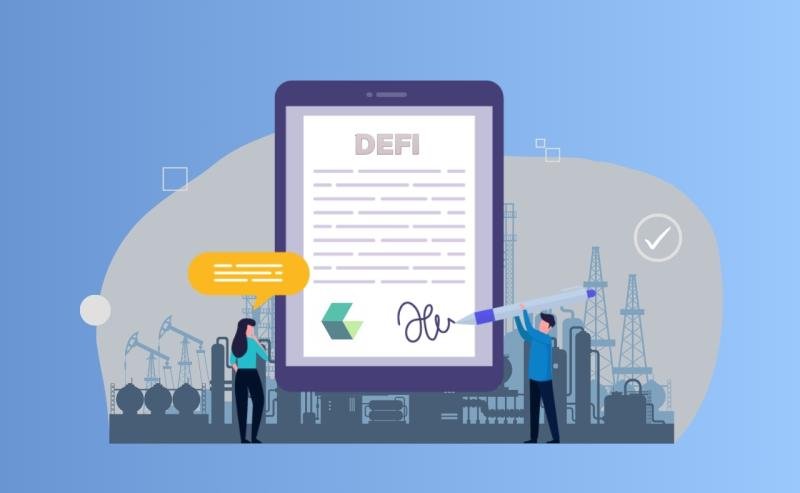How DeFi and Smart Contracts Are Transforming Business Operations
The financial landscape is undergoing a transformation, and decentralized finance (DeFi) stands at the center of this shift. Unlike traditional banking systems, DeFi enables peer-to-peer transactions without the need for intermediaries such as banks or brokers. The backbone of this innovation lies in smart contracts-self-executing programs that automate agreements between parties.
In today’s business environment, organizations across industries are exploring how these technologies can streamline operations, enhance transparency, and cut costs. From supply chain to healthcare, and from insurance to global trade, smart contracts have become the building blocks of a new digital economy. This is why companies are looking beyond traditional systems and embracing the value of DeFi.
Major Advantages of Using DeFi Smart Contracts in Operations
The advantages of integrating DeFi-powered smart contracts into industries are numerous:
Transparency: Transactions are recorded on public ledgers, leaving no room for hidden practices.
Automation: Processes like payments, settlements, and compliance are executed automatically without manual intervention.
Security: The decentralized structure and cryptographic algorithms provide robust protection against fraud and data tampering.
Cost efficiency: Eliminating intermediaries reduces transaction and operational costs significantly.
Accessibility: Businesses and individuals in underserved markets gain equal access to global financial systems.
Scalability: With the right infrastructure, industries can manage thousands of transactions seamlessly.
Process of Implementing DeFi Smart Contract Solutions
Implementing DeFi solutions is not a random activity-it follows a structured approach:
Requirement Analysis: Understanding industry pain points and defining objectives.
Smart Contract Design: Developing logic for agreements, payments, or service execution.
Security Review: Ensuring code is error-free and resistant to attacks.
Integration: Connecting the smart contracts to enterprise platforms.
Testing: Running pilot projects to check performance under various scenarios.
Monitoring: Launching the contracts and ensuring continuous updates.
This systematic process ensures that businesses not only adopt DeFi but also leverage it effectively.
Mistakes to Avoid in DeFi Smart Contract Adoption
Adopting DeFi-powered systems can be rewarding, but companies often stumble due to common mistakes:
Skipping security audits – Deploying without thorough code testing exposes businesses to vulnerabilities.
Ignoring regulations – Industries must account for compliance to avoid legal penalties.
Poor integration planning – Without aligning with existing systems, adoption becomes chaotic.
Overlooking scalability needs – Short-sighted planning may hinder future growth.
Neglecting user experience – Complex interfaces discourage employees and customers alike.
Avoiding these pitfalls ensures smoother adoption and better ROI.
Industry Pain Points Addressed by Smart Contracts
Different industries face unique challenges that smart contracts can directly address:
Finance: Slow settlements, high transaction fees, and fraud.
Healthcare: Data privacy issues and inefficient record management.
Insurance: Complex claim settlements and lack of transparency.
Supply Chain: Counterfeit goods, delayed deliveries, and poor tracking.
Real Estate: Lengthy property transfer processes and high paperwork.
Trade & Logistics: Cross-border payment delays and documentation errors.
These pain points create inefficiencies that stall growth and increase operational expenses.
How DeFi Smart Contracts Solve Industry Challenges
DeFi-powered smart contracts are positioned to solve these challenges:
Finance: Instant settlement and secure peer-to-peer lending platforms.
Healthcare: Immutable patient records and automated insurance claim processing.
Insurance: Smart claims that release funds after pre-set conditions are met.
Supply Chain: End-to-end visibility with tamper-proof digital records.
Real Estate: Tokenized property assets enabling fractional ownership and easy transfers.
Trade & Logistics: Automated documentation and real-time cross-border payments.
Each solution reduces complexity and builds trust across stakeholders.
Industry Current Use Case
Smart contracts are no longer theoretical-they are already in use across industries:
Banking: DeFi lending protocols providing alternatives to traditional loans.
Retail: Loyalty programs executed via tokenized systems.
Energy Sector: Peer-to-peer trading of renewable energy.
Healthcare: Secure sharing of electronic medical records between providers.
Logistics: Real-time shipment tracking using blockchain-powered contracts.
These live examples prove that industries are steadily integrating decentralized systems.
Barriers Hindering Industry Adoption
Despite clear benefits, certain hurdles slow down adoption:
Regulatory uncertainty: Different jurisdictions have conflicting rules.
Lack of awareness: Businesses are still hesitant due to limited understanding.
High initial costs: Development and auditing can require significant investment.
Scalability concerns: Not all platforms can handle large-scale usage.
Talent gap: Limited skilled developers familiar with blockchain technologies.
Addressing these barriers is key to making adoption widespread.
The Road Ahead for DeFi Smart Contracts in Industries
The future of DeFi-powered smart contracts is set to redefine how industries operate. Innovations like integration with AI and IoT will enable contracts to interact with devices, automating processes in real time. Cross-chain interoperability will allow seamless operations across multiple blockchain networks, while enterprise adoption will gradually replace legacy systems with decentralized infrastructure. Additionally, transparent blockchain solutions are expected to drive sustainable finance initiatives, making green and ethical projects more viable.
As DeFi moves from niche applications to mainstream use, organizations that embrace these technologies early will gain a significant competitive advantage. Businesses across finance, healthcare, supply chain, insurance, real estate, and logistics are discovering that partnering with a DeFi Smart Contract Development Company provides tailored solutions to meet specific industry needs. Access to skilled DeFi Smart Contract Developers and comprehensive DeFi Smart Contract Development Services ensures that enterprises can implement secure, scalable, and efficient systems.
Ultimately, DeFi Smart Contract Development Solutions are not just a technological upgrade-they are becoming a strategic necessity. Companies that adopt these innovations are positioning themselves at the forefront of digital transformation, ready to navigate a world where transparency, automation, and trust are paramount.
Learn more about our DeFi Smart Contract solutions – https://www.nadcab.com/defi-smart-contract
Explore all our services at Nadcab Labs – https://www.nadcab.com
Contact our Team at info@nadcab.com
Nadcab Labs
Pratapgarh Rd, Barrister Mullah Colony, MNNIT Allahabad Campus, Teliarganj, Prayagraj, Uttar Pradesh 211002, India
Phone: +91 9236503594
Email: info@nadcab.com
Website: https://www.nadcab.com
Name: Aman Kumar Pandey
Email: info@nadcab.com
Phone: +91 7054671372
Nadcab Labs is a leading blockchain and technology solutions company dedicated to delivering innovative and secure digital solutions. The enterprise focuses on developing decentralized applications, smart contract solutions, DeFi platforms, and Web3 services that empower businesses and individuals to leverage the full potential of blockchain technology. With a strong emphasis on security, scalability, and user-centric design, Nadcab Labs aims to bridge the gap between traditional systems and the decentralized digital future.
This release was published on openPR.

















